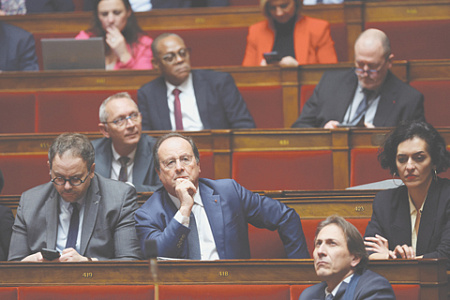
A year after President Emmanuel Macron’s decision to dissolve the lower house of parliament, France is once again on edge. Macron regained the constitutional power to dissolve the National Assembly on July 8, a prospect that has emboldened the opposition. The left-wing Unbowed France party is now pushing for not just another parliamentary election, but an early presidential vote, plunging the nation into a state of heightened political uncertainty.
The call for Macron to step down, articulated by Unbowed France’s parliamentary leader Manuel Bompard, stems from widespread public anger over the government’s controversial pension reform and its handling of the economy. The opposition argues that the president must be held accountable for the deep political divisions and social unrest gripping the country. However, the prospect of Macron voluntarily leaving the Elysée Palace before his term ends in 2027 remains remote.
According to political analysts, including Sergey Fedorov of the Institute of Europe RAS, Macron is determined to serve his full term. Furthermore, a sudden presidential resignation could prove more perilous than beneficial, even for the opposition. With France’s fractured political landscape split among three blocs—none with a clear majority—and ongoing socio-economic fragility, forcing a leadership crisis could destabilize the nation. Most parties appear unwilling to risk such a potentially destructive move.
Despite the unlikelihood of an immediate election, the race for 2027 has unofficially begun. Potential successors within Macron’s own centrist camp, such as former prime ministers Gabriel Attal and Édouard Philippe, are already positioning themselves, carefully attempting to distance their political brands from the increasingly unpopular president.
A familiar cast of political veterans is also preparing for a potential run. The left remains divided, with 73-year-old Jean-Luc Mélenchon expected to make his fourth presidential bid for Unbowed France. Meanwhile, other socialist and green parties are trying to coalesce around a single, more moderate alternative. This group of elder statesmen also includes 74-year-old François Bayrou and Michel Barnier, both with extensive governmental experience.
Perhaps the most notable potential comeback is that of former President François Hollande. Remembered as one of the most unpopular leaders in modern French history, Hollande, whose presidency from 2012 to 2017 was marked by high unemployment and a failed tax policy, is hinting at a return. While no official announcement has been made, his recent media appearances and cryptic comments suggest he sees an opening for a moderate-left candidate—namely, himself.
Contrasting sharply with this old guard is the new face of the far-right, 29-year-old Jordan Bardella. As the president of the National Rally party, he is widely expected to be its presidential candidate, stepping in for the party’s figurehead, Marine Le Pen, who is currently ineligible to run due to a conviction for misusing EU funds. Bardella’s youth and popularity present a formidable challenge to the established political order.
Predicting an outcome in this volatile climate is nearly impossible. Public dissatisfaction with the current government is rampant, and the situation is compounded by global political and economic uncertainty. Recent polling from the Odoxa institute reflects this dynamic, placing the far-right figures of Bardella and Le Pen ahead of all other potential candidates, signaling a potentially dramatic shift in France’s political future.
